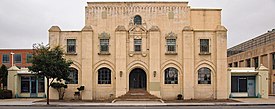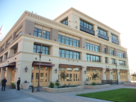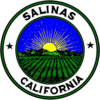Salinas | |
|---|---|
|
Top: Monterey County Court House; downtown; middle: historic Monterey County Jail building; bottom: Taylor Farms headquarters; downtown. | |
|
| |
| Nickname: "The Salad Bowl of the World"[1] | |
| Motto(s): "Rich in Land, Rich in Values."[2] | |
 Location of Salinas, California | |
| Coordinates: 36°40′40″N 121°39′20″W / 36.67778°N 121.65556°W | |
| Country | United States |
| State | California |
| Region | Northern California |
| County | Monterey |
| Incorporated | March 4, 1874[3] |
| Government | |
| • Type | Council-Manager |
| • Mayor | Kimbley Craig[4] |
| • State senator | Shannon Grove (R)[5] |
| • Assemblymember | Dawn Addis (D)[5] |
| • U. S. rep. | Zoe Lofgren (D)[6] |
| Area | |
| • City | 23.45 sq mi (60.74 km2) |
| • Land | 23.42 sq mi (60.66 km2) |
| • Water | 0.03 sq mi (0.08 km2) 0.16% |
| Elevation | 52 ft (16 m) |
| Population | |
| • City | 163,542 |
| • Rank | 1st in Monterey County 35th in California 163rd in the United States |
| • Density | 7,000/sq mi (2,700/km2) |
| Time zone | UTC−8 (Pacific) |
| • Summer (DST) | UTC−7 (PDT) |
| ZIP Codes | 93901–93903, 93905–93908, 93912, and 93915 |
| Area code | 831 |
| FIPS code | 06-64224 |
| GNIS feature IDs | 277589, 2411768 |
| Website | www |
Salinas (/səˈliːnəs/; Spanish for "Salt Flats") is a city in the U.S. state of California and the seat of government of Monterey County. With a population of 163,542 in the 2020 Census, Salinas is the most populous city in Monterey County.[10] Salinas is an urban area located along the eastern limits of the Monterey Bay Area, lying just south of the San Francisco Bay Area and 10 miles (16 km) southeast of the mouth of the Salinas River.[11] The city is located at the mouth of the Salinas Valley, about eight miles (13 km) from the Pacific Ocean, and it has a climate more influenced by the ocean than the interior.
Salinas serves as the main business, governmental, and industrial center of the region.[12] The marine climate is ideal for the floral industry, grape vineyards, and vegetable growers. Salinas is known as the "Salad Bowl of the World" for its large, vibrant agriculture industry.[13]
It was the hometown of writer and Nobel laureate John Steinbeck (1902–68), who set many of his stories in the Salinas Valley and Monterey.[14] Salinas has a high Hispanic proportion, which at 79.6%, is the highest proportion of Hispanic Americans out of any city in California, and 8th largest overall in the nation.[15] The city also has a sizable Asian-American population, with a large and historic Filipino population. The city once also had the 2nd biggest Chinatown in the nation behind only San Francisco.[16]
- ^ "Community Profile - Visitors". City of Salinas, California. Archived from the original on January 21, 2015. Retrieved January 31, 2015.
- ^ "City of Salinas - Home". City of Salinas Economic Development. Archived from the original on December 19, 2014. Retrieved December 8, 2014.
- ^ "California Cities by Incorporation Date". California Association of Local Agency Formation Commissions. Archived from the original (Word) on November 3, 2014. Retrieved August 25, 2014.
- ^ Mayor Joe Gunter died unexpectedly on June 29, 2020. The city councilmembers will alternate as acting mayor until an election is held. Meier, Megan (June 30, 2020). "City of Salinas selects interim mayor". KION. Retrieved July 1, 2020.
District 5 city council member, Christie Cromeenes, will serve as mayor until the first week in October.
- ^ a b "Statewide Database". UC Regents. Archived from the original on February 1, 2015. Retrieved November 5, 2014.
- ^ "California's 18th Congressional District - Representatives & District Map". Civic Impulse, LLC. Retrieved September 24, 2014.
- ^ "2019 U.S. Gazetteer Files". United States Census Bureau. Retrieved July 1, 2020.
- ^ "Salinas". Geographic Names Information System. United States Geological Survey, United States Department of the Interior. Retrieved November 18, 2014.
- ^ a b "Salinas (city) QuickFacts". US Census Bureau. Retrieved August 13, 2021.
- ^ "Population and Housing Unit Estimates". Retrieved May 21, 2020.
- ^ Durham, David L. (1998). California's Geographic Names: A Gazetteer of Historic and Modern Names of the State. Clovis, Calif.: Word Dancer Press. p. 948. ISBN 1-884995-14-4.
- ^ Johnson, Jim (July 31, 2014). "Monterey County, Salinas discuss alternatives to Capital One complex buy". Monterey Herald: News. Monterey Herald. Archived from the original on December 16, 2014. Retrieved November 26, 2014.
- ^ McKibben, Carol Lynn (2022). Salinas : a history of race and resilience in an agricultural city. Stanford, California. ISBN 978-1-5036-2945-5. OCLC 1236850398.
{{cite book}}: CS1 maint: location missing publisher (link) - ^ Nolte, Carl (June 3, 2016). "Steinbeck Country: Touring the land that inspired a legend". San Francisco Chronicle. Archived from the original on August 8, 2017. Retrieved June 25, 2019.
- ^ "P2: HISPANIC OR LATINO, AND NOT HISPANIC OR LATINO BY RACE". 2020 Census. United States Census Bureau. Retrieved October 10, 2021.
- ^ Davis-King, Shelly; Jew, Nicholas P.; Erlandson, Jon M.; Haversat, Trudy; Breschini, Gary S.; Bettinger, Robert L. (November 10, 2014). "NEWS AND NOTES". California Archaeology. 6 (2): 297–313. doi:10.1179/1947461x14z.00000000049. ISSN 1947-461X. S2CID 218667520.








